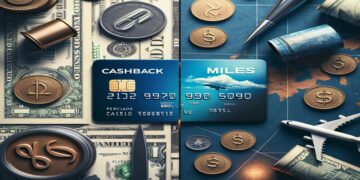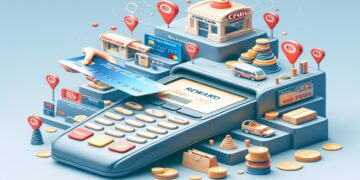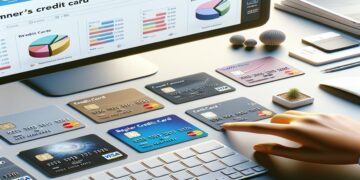The Pros and Cons of Using Credit Cards: What You Need to Know

Advantages of Credit Cards
In today’s fast-paced world, credit cards can offer incredible convenience and flexibility. One of the standout benefits is their ease of use; carrying a credit card is far more convenient than ensuring you have cash on hand for every purchase. Whether you’re shopping for groceries, splurging on a new outfit, or booking a last-minute flight, a simple swipe or tap is all it takes.
Additionally, many credit cards come with rewards programs. These programs can provide significant benefits, such as cash back on everyday purchases, airline miles for travel enthusiasts, or points that can be redeemed for discounts or free products. For example, a travel enthusiast may find a card that offers double points for flights and hotels, allowing them to save on future vacations.
An often-overlooked advantage is credit building. Using a credit card responsibly, such as making payments on time and keeping your balance low, can help improve your credit score. A higher credit score can lead to better loan terms and lower interest rates when making major purchases, such as buying a home or a car. In essence, responsible credit card use can pave the way to a brighter financial future.
Disadvantages of Credit Cards
However, it’s essential to recognize that credit cards are a double-edged sword. One significant downside is the risk of debt. High-interest rates can result in debt accumulating quickly if you’re not careful. For instance, if you carry a balance month-to-month, you could end up paying far more than you initially charged due to interest accrual.
There are also potential fees that can eat into your finances. Many credit cards come with annual fees, late payment fees, and over-limit fees, which can add to the overall cost of having a card. As a result, it’s crucial to read the fine print and understand all associated fees before applying for a credit card.
Another challenge is impulse spending. The ease with which you can make purchases using a credit card can lead to unnecessary spending. When you have a plastic card instead of cash, it may feel less tangible, making it easier to overlook how much you are truly spending. This is particularly true during sales events or holiday shopping seasons when emotional buying can run rampant.
Recognizing these pros and cons will empower you to make informed choices. By understanding your own financial habits and goals, you can lead yourself to responsible credit card use. With the right knowledge and strategies, you can turn your credit card from a potential financial trap into a powerful tool for building a secure financial future.
CHECK OUT: Click here to explore more
Understanding the Balance: Weighing the Benefits and Risks
As you navigate the world of credit cards, it’s essential to approach them with both excitement and caution. The many advantages of credit cards can greatly enhance your purchasing power and financial options, but it is equally important to acknowledge their potential pitfalls. Let’s delve deeper into the pros and cons, giving you the tools to wield credit cards wisely.
The Benefits Unveiled
Credit cards can transform the way you manage your finances in several compelling ways:
- Emergency Backup: In times of unexpected financial strain, having a credit card acts as a safety net. Whether it’s a medical emergency or a car breakdown, access to funds can alleviate stress and prevent a crisis from turning into a disaster.
- Fraud Protection: Many credit card providers offer robust fraud protection, ensuring that you’re not held responsible for unauthorized charges if your card is lost or stolen. This security is significantly stronger than cash or debit cards, making credit cards a safer option for frequent transactions.
- Extended Warranties and Purchase Protection: Some credit cards come with perks such as extended warranties on purchased items or purchase protection against theft or damage if you use your card for transactions. These additional layers of coverage can provide not just peace of mind, but also real financial benefit.
Navigating the Risks
While the benefits are enticing, being aware of the risks involved is crucial to using credit cards responsibly:
- Over-reliance on Credit: It’s easy to fall into the trap of relying on credit for everyday expenses, leading to mounting debt. Being mindful of your spending patterns is key to avoiding this pitfall.
- Impact on Credit Score: Negative behaviors, such as maxing out your credit limit or missing payments, can significantly harm your credit score. As tempting as it may be to indulge in purchases, staying within your limits is essential for long-term financial health.
- Complex Terms and Conditions: Credit cards can come with various terms that may confuse consumers. Understanding interest rates, grace periods, and other conditions is imperative to avoid surprises down the line.
By recognizing both the strengths and vulnerabilities that come with credit card use, you empower yourself to make decisions that align with your financial goals. By cultivating awareness and developing smart habits, you can harness the benefits of credit cards while minimizing their risks. This balanced approach will pave the way for a more secure and fulfilling financial future, encouraging you to utilize credit as a tool for growth rather than a source of stress.
SEE ALSO: Click here to read another article
Making the Most of Your Credit Card Experience
Utilizing credit cards effectively can empower you not only to safeguard your finances but also to enhance your overall purchasing experience. The true art of credit card usage lies in striking a balance between leveraging the benefits and mitigating the risks. By adopting some strategies, you can shift the equation in your favor, making credit work for you.
Strategies for Responsible Credit Card Use
Embracing wise spending habits can help you fully enjoy the advantages of credit cards while steering clear of potential pitfalls:
- Create a Budget: Establishing a well-defined budget that accounts for your credit card spending can help you monitor your expenses. This financial framework allows you to allocate funds for credit card payments while ensuring that you don’t overspend.
- Pay Your Balance in Full: Whenever possible, aim to pay your credit card balance in full each month. This strategy not only helps you avoid interest charges but also reinforces your commitment to maintaining a healthy financial profile. Over time, this conscientious approach cultivates discipline and further enhances your credit score.
- Take Advantage of Rewards: Many credit cards offer reward programs, such as cashback, points, or travel perks. Prioritizing credit cards that align with your spending habits can yield significant benefits over time. For example, if you frequently travel, a card with excellent travel rewards may enhance your adventures and improve your overall experience.
Building a Strong Credit History
Your credit card usage plays a pivotal role in establishing and maintaining a robust credit history. Here are key considerations:
- Timely Payments: Paying your bills on time is one of the most significant factors influencing your credit score. Automating your payments can serve as an effective way to ensure that deadlines are never missed, allowing you to build trust with lenders and get the best rates on future loans.
- Diversify Your Credit: Having a variety of credit types, including installment loans or lines of credit along with your credit card, can enhance your credit profile. This diversification demonstrates your ability to manage different types of credit responsibly.
- Monitor Your Credit Report: Regularly checking your credit report allows you to identify inaccuracies or fraudulent activities that could undermine your credit score. In the U.S., you are entitled to one free credit report each year from the three major credit bureaus, and utilizing this resource can prove invaluable.
By embracing these strategies, you can maximize the benefits of credit cards while ensuring financial stability. The key is to adopt a proactive mindset, treating credit as a tool to enrich your life rather than a burden. Remember that your financial future is a journey, and every responsible financial choice you make today can pave the way for greater opportunities tomorrow.
SEE ALSO: Click here to read another article
Conclusion: Your Financial Journey with Credit Cards
In conclusion, the journey of credit card usage can be both rewarding and challenging. By understanding the pros and cons of credit cards, you are better equipped to navigate this financial landscape. Credit cards can offer incredible benefits such as convenient payment methods, rewards programs, and the ability to build a strong credit history. However, they also come with risks including high-interest rates, debt accumulation, and potential damage to your credit score if mismanaged.
The most crucial takeaway is to approach credit cards with awareness and responsibility. By creating a budget, paying your balances in full, and taking full advantage of rewards while being mindful of your spending habits, you can turn credit cards into powerful financial tools. Furthermore, by consistently monitoring your credit report and understanding your credit score, you can make informed decisions that positively impact your financial future.
Ultimately, recognizing the dual nature of credit products empowers you to harness their advantages while minimizing drawbacks. Treat credit cards as a valuable means for achieving your financial goals instead of a source of anxiety. Every thoughtful decision and strategic action you undertake with your credit card will shape your financial path ahead. Embrace this opportunity, and take control of your financial destiny today, for a brighter tomorrow.

Linda Carter is a writer and financial expert specializing in personal finance and financial planning. With extensive experience helping individuals achieve financial stability and make informed decisions, Linda shares her knowledge on the Take Care Garden platform. Her goal is to empower readers with practical advice and strategies for financial success.





